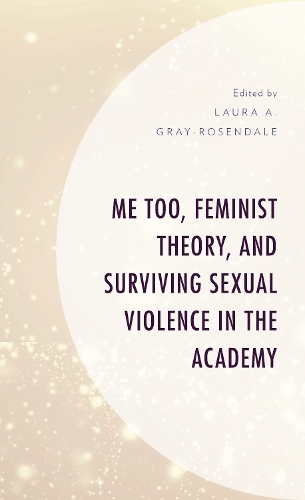
Me Too, Feminist Theory, and Surviving Sexual Violence in the Academy
(Paperback)
Publishing Details
Me Too, Feminist Theory, and Surviving Sexual Violence in the Academy
By (Author) Laura A. Gray-Rosendale
Bloomsbury Publishing PLC
Lexington Books
8th March 2022
United States
Classifications
Professional and Scholarly
Non Fiction
371.782
Physical Properties
Paperback
268
Width 153mm, Height 230mm, Spine 20mm
404g
Description
Powerfully written and theoretically grounded, Me Too, Feminist Theory, and Surviving Sexual Violence in the Academy collects a range of perspectives from sexual assault survivors with backgrounds in academia. The contributors in this collection connect their experiences of sexual violence to their research and work within the academy as well as their lives outside of it. Contributors analyze the events surrounding their experiences with sexual violence as well as the cultural, social, and political effects. Their analyses are located within discussions of recent cultural events and the larger contexts of race, ethnicity, class, age, gender, sexuality, region, and nation.
Reviews
Laura A. Gray-Rosendale's collection, Me Too, Feminist Theory, and Surviving Sexual Violence in the Academy, offers an extraordinary range of accessible and personal essays told from across the academy. The authors bravely share their stories while also providing scholarly analysis of how these experiences altered their professional futures and offering insight about what happens when such experiences collide with the academy at various levels. This book will be a wonderful resource for professors teaching on Title IX and Me Too related topics. -- Donna Freitas, author of Consent: A Memoir of Unwanted Attention
Laura A. Gray-Rosendale has introduced and assembled a vibrant and eloquent collection of essays further animating the diverse and devastating disclosures of the Me Too Movement, specifically in academic settings. Gray-Rosendale and her contributors are each survivors. Distinguished by elegance in writing, Gray-Rosendales work combines the personal and the political, the experiential and the analytic. The result compels a new and deeper understanding of sexual violence against women, and how this violence is often also intertwined with racism and/or homophobia. Likewise, the limits of Title IX enforcement, and legal recourse are thrown into sharp relief. We feel ourselves weeping at the suffering caused by the violence, some of it casual and thoughtless, some of it vicious, and all of it revealing the hatred of women at its base. -- Bettina Aptheker, University of California, Santa Cruz
Author Bio
Laura A. Gray-Rosendale is Presidents Distinguished Teaching Fellow and director of STAR English at Northern Arizona University.
